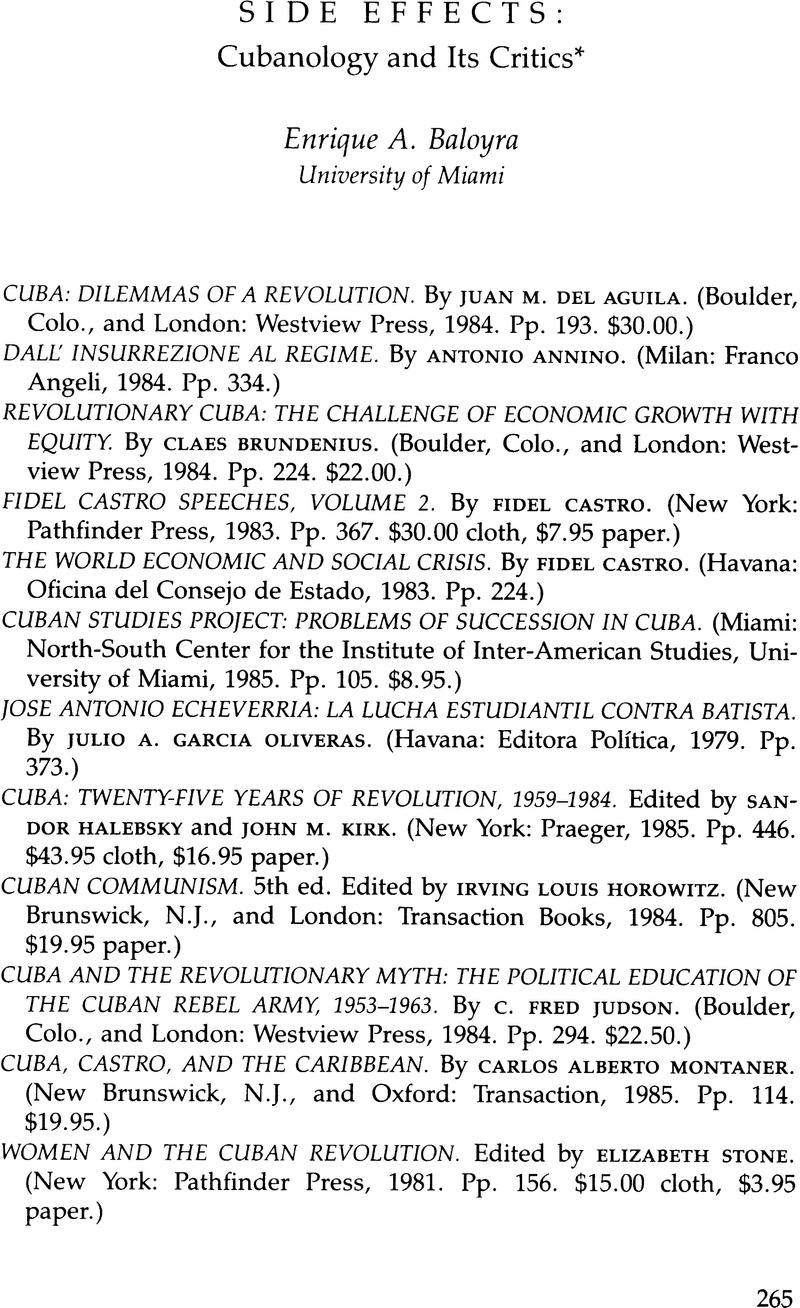Article contents
Side Effects: Cubanology and Its Critics
Review products
Published online by Cambridge University Press: 12 October 2022
Abstract

- Type
- Review Essays
- Information
- Copyright
- Copyright © 1987 by the University of Texas Press
References
Notes
1. “Las cinco grandes preguntas de la filosofía y la ciencia política,” Libro-Homenaje a Manuel García Pelayo 2, Facultad de Ciencias Jurídicas y Políticas (Caracas: Universidad Central de Venezuela, 1980), 651–52.
2. See Umberto Eco, The Name of the Rose (New York: Warner, 1984), 68–69, 98–100, 149–53, 155–56, 214–15, 220–22, 234–36, 576–79.
3. I have borrowed the term literal populism from James Dunkerley, “Writing on Revolutions,” Journal of Latin American Studies 15, pt. 2 (Nov. 1983):487.
4. See Carmelo Mesa-Lago, “Revolutionary Empathy vs. Calculated Detachment in the Study of the Cuban Revolution,” Cuban Studies/Estudios Cubanos 11, no. 1 (Jan. 1981):90–92.
5. This is the view of José Alvarez, “The Dying Dialogue between U.S. and Cuban Scholars,” Cuban Studies/Estudios Cubanos 14, no. 2 (Summer 1984):66.
6. See, for example, H. Yanes Quintero, “Comment,” Cuban Studies/Estudios Cubanos 13, no. 2 (Summer 1983):112–18.
7. José Luis Rodríguez, “Un enfoque burgués del sector externo de la economía cubana,” Cuba Socialista 5, no. 1 (Mar.–Apr. 1985):79.
8. Carlos Alberto Montaner, “Fidel Castro, indio aborigen,” El Miami Herald, 4 Aug. 1985, p. 13 (my translation).
9. I was surpised by the relative dearth of monographs published on the occasion of the twenty-fifth anniversary of the revolution. With the possible exception of Mesa-Lago's recent book-length essay, most of the more familiar names in the field (Jorge Domínguez, Richard Fagen, Barry Farber, Edward González, William LeoGrande, Andrés Suárez, Jaime Suchlicki, and Nelson Valdés) let the occasion pass without a major contribution. Irving Horowitz published a new edition of his anthology, while Hugh Thomas's observance consists of the short tract cited here. To be sure, the sociology of the profession also takes its toll, but there may be a degree of exhaustion reflected here.
10. Albert O. Hirschman, “The Search for Economic Determinants,” in The New Authoritarianism in Latin America, edited by David Collier (Princeton, N.J.: Princeton University Press, 1979), 82.
- 2
- Cited by


